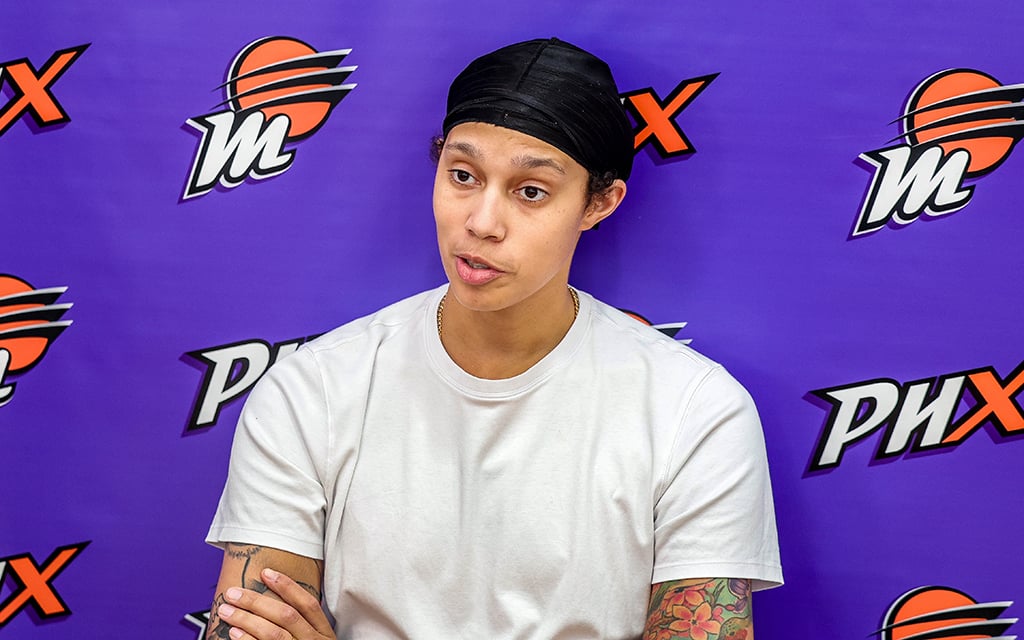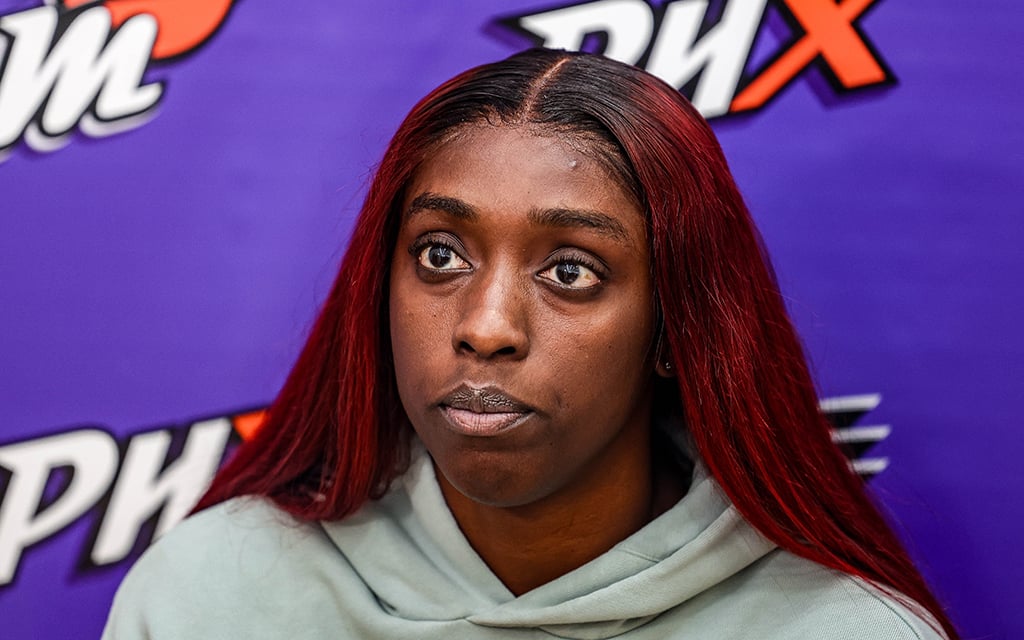PHOENIX – The rapid growth of the WNBA should be an opportunity for players to celebrate. But due to an unfortunate turn of events, players including Phoenix Mercury star Brittney Griner are taking a greater stance against the same social injustices she has fought against during her entire career.
Racism and sexism are all-too-familiar problems for Griner and they are starting to become a serious threat to the players in one of the fastest-growing leagues in the world.
After Connecticut Sun guard DiJonai Carrington shared a vulgar email that included a racial slur and explicit threats of sexual assault, Griner and Mercury guard Kahleah Copper felt compelled to speak out against foul behavior directed at WNBA players during Phoenix’s exit interviews Thursday.
“Some of those things that I saw online were nasty and just unacceptable,” Copper said. “(That’s) not something that I would want for any of my peers. I don’t like seeing that at all.”
Griner, who has been at the forefront of many egregious online encounters, added, “It’s not that hard to understand equality, to understand respect. Those are things that we should’ve learned as kids honestly.”
The WNBA released a statement following Carrington’s post, denouncing the type of messages that she received online.
That wasn’t enough though, according to Griner. She believes that the league should be held accountable for its lack of protection of its players. And, frankly, she believes that the WNBA’s social media can monitor and filter social media posts but decides not to.
“Quick action,” Griner said, referring to how she thinks the league can solve these issues. “Not waiting to put out a statement that is way overdue.
“There is definitely a thing that you can do on social media, I do it on my page, where you can limit some of the comments that should not be on the page, because it doesn’t reflect what we stand for or what we are as a league, but it’s just all up and down the W(NBA)’s page. But I get it, it’s all about likes. All about the number of comments no matter how good or bad the comments or likes are.”

Phoenix Mercury center Brittney Griner suggests the WNBA should take more measures to protect players from hostile fans. (Photo by Spencer Barnes/Cronkite News)
Players aren’t only experiencing harassment online – it’s also happening right in front of them at the games. An Indiana Fever fan targeted Carrington by wearing a shirt saying “BAN NAILS” and cartoonish fake nails after Carrington inadvertently hit Fever guard Caitlin Clark in the eye during a game.
The WNBA players’ association is also accusing the media of harassment. The Carrington story took a new turn Friday when the WNBPA issued a statement condemning longtime sportswriter Christine Brennan’s coverage of the incident.
After the Fever game, Brennan asked Carrington, “When you went and kinda swatted at Caitlin, did you intend to hit her in the eye?”
WNBPA executive director Terri Jackson released a statement accusing Brennan of “a blatant attempt to bait a professional athlete into participating in a narrative that is false and designed to fuel racist, homophoic and mysoginistic vitriol on social media.”
With its growing popularity, the WNBA often seems to be at the center of the news cycle.
There’s a stark difference in the type of “new” fans who are watching the league since its growth this past season. Griner acknowledges the dichotomy.
“I don’t appreciate the new fans that sit there and yell racial slurs at myself and my teammates and the people that I’ve played against,” Griner said. “Yeah, those might be opponents, but those are friends too and they don’t deserve that.
“But I do appreciate the new fans that respect the game that are here to grow our league. I appreciate the players that are coming in with the spark that they have and the level they are playing at.”
The attention that Clark and Chicago Sky rookie Angel Reese brought to the league, although it has led to problematic discourse at times, has mostly been beneficial to the WNBA in terms of ratings, revenue and engagement on social media.
Wednesday’s playoff matchup between the Fever and Sun was the most-viewed WNBA game ever on cable, peaking at 3.4 million viewers, according to ESPN. Viewership was up 507% versus last year’s first round on ESPN. The Mercury’s season-ending loss to Minnesota was the third-most viewed playoff game ever, peaking at 2.1 million viewers.
Growth is great, but growing pains are inevitable. All Griner and Copper want is awareness of the problems and accountability from people who are capable of controlling them.
“We all deserve to play in a safe environment and not have to worry about racial (and) sexist comments,” Griner said.
“We’re playing a game,” Copper added, “a game that we love. A game that takes us so many different places; brings us joy. It’s just not a place for hate. We work our very hardest to be the best at what we do.”


